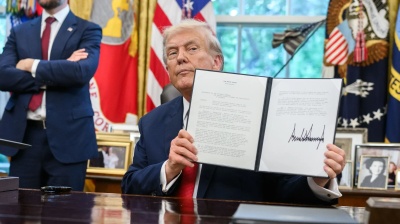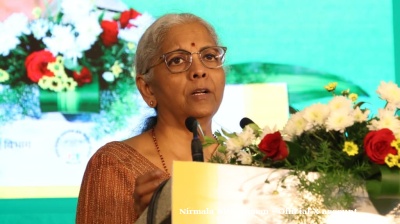Hungarian Prime Minister Viktor Orban has released a report to the president of the European Council in which he outlines an assessment of a self-declared "peace mission" that included a trip to Russia, drawing condemnation by European leaders and EU institutions and Nato allies.
Shortly after assuming the six-month rotating presidency of the Council, Hungary’s illiberal leader travelled to Kyiv for the first time, then flew to Moscow. After a short stint in Azerbaijan at a meeting of the Organisation of Turkic States, he travelled to Beijing to meet Chinese President Xi Jinping. Orban left the Nato summit early in Washington and headed to Mar-a-Lago in Florida to meet US presidential hopeful Donald Trump in the last leg of his tour.
Political leaders in Brussels said that the Hungarian leader had no authority to represent the EU in talks and that Orban, seen as the closest ally of Vladimir Putin in the EU, had ignored a "de facto ban" on travelling to Russia. Hungary’s leader used the logo of the European presidency during the trips, creating the illusion that he represented the EU in these talks. Putin referred to that in a press conference. Later, the logo was taken off the photos.
The European Parliament in its first resolution for the 2024-2029 term on condemned Orban’s visit to Moscow as a "blatant violation of EU treaties and common foreign policy".
Previously, a letter sent by 63 MEPs to the leaders of the European Union highlighted significant concerns about Orban’s actions during Hungary's presidency of the Council of the EU, Politico reported.
The EU’s legal service told member states on Wednesday that Orban's actions had violated the bloc’s treaties.
The European Commission, in a directive announced on July 15 instructed its commissioners not to attend the informal ministers’ meetings and there were calls by some MEPs to strip Hungary of the EU presidency.
In the letter addressed to European Council President Charles Michel, Orban noted that the intensity of the Russian-Ukrainian military conflict could escalate radically in the near future. He stated from personal experience that "the warring parties are determined to further involve themselves in the conflict, and neither wants to initiate a ceasefire or peace negotiations.
"Therefore, we can assume that tensions will not decrease and the parties will not seek a way out of the conflict without significant external intervention," he writes.
Orban identified three global players capable of influencing developments: the European Union, the United States, and China. He also emphasised the importance of considering Turkey as a significant regional player and the only successful mediator between Ukraine and Russia since the hostilities began in 2022.
He observed that the US is heavily occupied with the presidential election campaign and suggested that Joe Biden is unlikely to change the current "pro-war policy" of the US.
The prime minister speculated that Trump would be ready to act as a peace mediator in the Russian-Ukrainian war immediately after his "likely electoral victory". In this case, the financial burden sharing between the US and the EU regarding Ukraine's financial support would "significantly shift to the EU's disadvantage", he claimed.
The Hungarian premier then presented his list of recommendations, which includes the launch of high-level political talks with China at the next peace conference, the reopening of direct diplomatic communication lines with Russia, while maintaining high-level political relations with Ukraine and the launch of coordinated political offensive towards the Global South to regain goodwill lost due to the stance on the Ukraine war.
News

Trump authorises CIA covert operations in Venezuela to topple Maduro
The White House has acknowledged granting the Central Intelligence Agency sweeping powers to conduct covert operations aimed at unseating President Nicolás Maduro, the NYT reported.

India’s finance minister to miss upcoming IMF and World Bank meetings
India’s Finance Minister Nirmala Sitharaman will not attend this week’s annual meetings of the International Monetary Fund and World Bank in Washington, as trade negotiations between New Delhi and Washington remain unresolved.

Young Ukrainians asylum seekers fleeing the war for Germany surges
The number of young Ukrainian fleeing the war and seeking asylum in Germany has surged, following Ukraine’s decision to partially lift its travel ban for men aged 18 to 22, according to figures from the German Interior Ministry.

US may double support for Argentina to $40bn conditional on policy reforms
Washington buys Argentine pesos and mulls creating a new private sector-led $20bn debt facility, which would bring total support to $40bn with the existing swap line, Treasury Secretary Bessent said.




